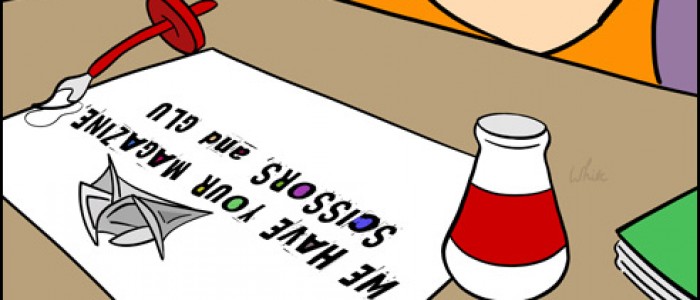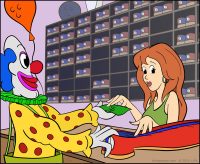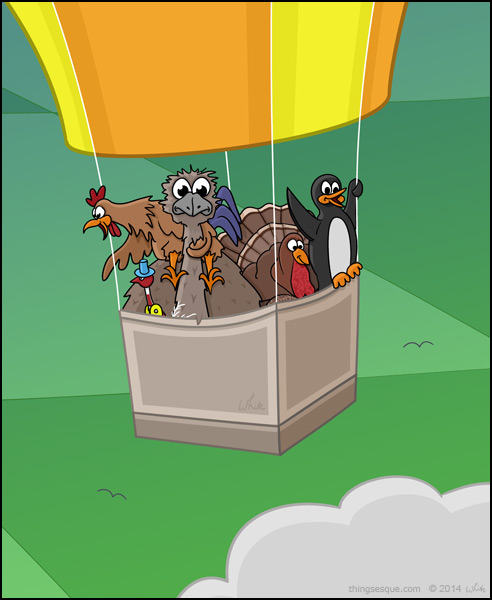A while back, I received an email that showed how the human brain is usually able to read text, even if the letters in the words are significantly jumbled.
So long as the first and last letters of each word remain in their correct location, it doesn’t matter how mixed up each word’s interior is, for most people, the text is still legible. I found this fascinating, but most of the examples I saw only had a few lines of text.
 I wanted to increase the length of this, so created my own version. To source some text, I had a look some well known books that are no longer covered by copyright. At first I was going to use Jane Austen’s “Emma”, but then happened upon H. G. Wells’ “War of the Worlds” (according to litverse.com) and knew that was the text to use.
I wanted to increase the length of this, so created my own version. To source some text, I had a look some well known books that are no longer covered by copyright. At first I was going to use Jane Austen’s “Emma”, but then happened upon H. G. Wells’ “War of the Worlds” (according to litverse.com) and knew that was the text to use.
Below is first chapter of “War of the Worlds”, with word lettering randomly jumbled. Obviously, this couldn’t be applied to words having three letters or less. Also, punctuation for the most part is left intact.
After processing this text, and having heard Jeff Wayne’s Musical Version of The War of the Worlds many times in the past, I now have Justin Hayward’s song, “Forever Autumn“, stuck in my head.
******
BOOK ONE
THE CIMNOG OF THE MATNRIAS
CETPHAR ONE
THE EVE OF THE WAR
No one wuold hvae bievleed in the lsat yares of the ntteienneh cetnury that this wlrod was bnieg wchtead kleney and csoelly by iegtclinlnees geatrer tahn man's and yet as mratol as his own; that as men bsiued teemveslhs aoubt tiher vuioars cncorens they were scistrniued and stiedud, prpeahs almsot as nwolarry as a man wtih a mcpioosrce mgiht sustirncie the trnsainet cateerurs that sarwm and mpltuliy in a dorp of wetar. Wtih iitfinne cecaomnplcy men wnet to and fro over tihs globe abuot thier lltite airaffs, senere in their asaursnce of their eprmie oevr mtaetr. It is pssioble that the iofusrina unedr the mopcriscoe do the same. No one gave a tuhghot to the oeldr wldros of spcae as scouers of hamun dnegar, or thuohgt of tehm olny to dismiss the idea of life upon tehm as ilpbmissoe or iblormbpae. It is cuoiurs to reacll some of the matenl hibats of those detarped dyas. At most tetiesrrral men fiencad trehe mhgit be oehtr men uopn Mras, pparhes ioernfir to tlvmehsees and rdeay to wmceloe a mrsiansoiy eispretrne. Yet asocrs the gulf of scape, mdnis taht are to our mdnis as orus are to tsohe of the betsas taht pesirh, icletnelts vsat and cool and usnetmhytaipc, rdgraeed tihs eatrh wtih einovus eeys, and swolly and suelry derw tehir pnals ainsgat us. And elary in the ttwineteh cturney came the garet dnullinsemsoiit.
The pnealt Mras, I searclcy need rnemid the rdaeer, rloevevs abuot the sun at a mean dtiancse of 140,000,000 miels, and the lihgt and heat it rieceevs from the sun is baerly hlaf of that rveiceed by this wlrod. It msut be, if the nbuelar hisophytes has any tutrh, oledr than our wolrd; and long broefe this etrah cesead to be mtloen, lfie upon its srfuace must have buegn its csroue. The fact taht it is scelcary one snetveh of the vmloue of the ertah must hvae aerlcaected its cnoloig to the tptuerarmee at whcih lfie cluod begin. It has air and waetr and all taht is naecsersy for the sppurot of amtneaid eneitxcse.
Yet so vain is man, and so beidnld by his vtiany, that no wtierr, up to the vrey end of the ntneneiteh cutnrey, exseesrpd any idea that innleiteglt lfie mihgt hvae doelpeved trehe far, or iedned at all, bneyod its ehrltay lveel. Nor was it glleneray usoteonrdd taht scnie Mars is odelr tahn our etarh, wtih srleccay a qaerutr of the seifcuapirl area and remeotr from the sun, it nercsisaely fllowos taht it is not olny mroe dinatst form time's bginnenig but nearer its end.
The sluecar cloinog taht must sdoeamy oetavrke our pelnat has aarldey gnoe far ideend wtih our nuohgbeir. Its phiscyal ciiotdonn is sltil lraegly a mystery, but we know now taht eevn in its eotqruaial rogien the midday tearrmuetpe brealy ahoperpacs taht of our csdelot witner. Its air is mcuh more aattnuteed than orus, its oeacns have shunrk uitnl they coevr but a thrid of its suacfre, and as its solw sanoess cganhe hgue swopncas gather and melt aoubt eiehtr ploe and pcdrlilaoeiy iunntade its taeptemre zeons. Taht lsat sgate of etasuhoxin, wcihh to us is stlil iircnldbey roetme, has boecme a pdsrnteeay perolbm for the ibnaitthnas of Mras. The ideiammte psuersre of nscteisey has behngetird thier ileecnltts, elngread tiher pwoers, and hdraeend thier hrteas. And looinkg acrsos sapce wtih iemrttnsuns, and igleilnecntes scuh as we have sclacrey daemred of, they see, at its nrsaeet dscanite olny 35,000,000 of miels sruwand of them, a mrnniog star of hope, our own wmarer palnet, geren wtih veiattgoen and gery wtih wtaer, wtih a cdluoy aophestmre eeolqnut of fltierity, with gmipelss trughoh its dtnirifg cuold wpiss of broad stcreehts of puopolus cotnury and nraorw, navy - cwredod saes.
And we men, the cueraerts who ihnbiat tihs earth, must be to tehm at laest as aieln and lolwy as are the mneokys and lmeurs to us. The iallntucetel side of man alrdaey atimds taht life is an iscsanent stlrguge for ecitnexse, and it wuold seem taht this too is the beelif of the midns upon Mars. Thier wrlod is far gone in its cilnoog and this wrlod is slitl cworedd with life, but ceorwdd olny wtih what they regrad as iniorefr amainls. To carry wrfarae sunarwd is, ineedd, their olny escpae form the duoserctitn taht, gieetaonrn atefr geaortinen, creeps uopn tehm.
And before we judge of tehm too hrslahy we msut rebemmer waht rhtluses and uettr dtucisoretn our own sieceps has worguht, not only upon ailamns, scuh as the vneisahd bsion and the dodo, but upon its ifneiorr raecs. The Tsnaianams, in sptie of tiher hmuan leisknes, wree eltnirey sepwt out of eteincsxe in a war of emtnitrieoaxn wegad by Eoprauen imtnrmgais, in the spcae of ffity yreas. Are we such astpeols of mcery as to cliaompn if the Mianrtas wreard in the same sriipt?
The Mainatrs seem to hvae ctlleauacd thier deecnst with aiazmng suettbly -- tehir mhetcmtaaial lrninaeg is etniedlvy far in escexs of ours -- and to hvae ciarerd out their pitaeraonrps wtih a wlel - nigh pfeerct umtnniiay. Had our iternsntmus ptteremid it, we mhigt have seen the ghrtaneig tlroube far bcak in the netientenh cunetry. Men lkie Scpiaallhrei wcatehd the red pealnt -- it is odd, by - the - bye, that for cultensos ctrineeus Mras has been the satr of war -- but filaed to ireptnert the ftutcuainlg acpanrpeaes of the mgrkains they mpepad so well. All that tmie the Mtnairas must hvae been gnttieg ready.
Druing the ositopiopn of 1894 a great lghit was seen on the ieulantmild part of the dsik, first at the Lcik Obrsavrteoy, then by Ptrreion of Nice, and then by oehtr oeerrbsvs. Enligsh rraedes herad of it first in the issue of NUARTE dtead Agusut 2. I am ilcnneid to thnik that tihs bzlae may have been the cnsitag of the hgue gun, in the vast pit snuk into tehir paelnt, form wcihh tiher soths were feird at us. Pcealuir mgiarkns, as yet ueplnanexid, were seen near the site of taht oaeurbtk dnruig the next two onitsppoois.
The sortm brsut upon us six yares ago now. As Mras aepocahrpd oitsopipon, Lavelle of Java set the weirs of the aocraomsnitl egacxnhe pttaaliinpg with the aniamzg igctilenelne of a huge oraubetk of inncsencedat gas uopn the pnlaet. It had orcreucd twdaros mhngidit of the tlwefth; and the stccosproepe, to wichh he had at once rrteseod, iaecnditd a msas of fnlimag gas, clhiefy hgroeydn, mvinog wtih an eonomrus vticoely tdoawrs tihs eatrh. Tihs jet of frie had become iinlbsive aobut a qtaeurr past telvwe. He cmaoerpd it to a csaloosl pfuf of fmlae senduldy and vniotelly suqrited out of the penlat, "as filnmag gases ruehsd out of a gun."
A sriglaulny aptoparprie phsare it prveod. Yet the nxet day terhe was nihotng of this in the peraps eepxct a liltte ntoe in the DILAY TGALPEREH, and the wrold wnet in ignoacrne of one of the geasrvt danergs that ever treaetenhd the hmuan rcae. I mghit not have haerd of the eiurpton at all had I not met Olgviy, the well - kownn aorntmesor, at Oasthretw. He was inlesemmy eetixcd at the nwes, and in the ecxses of his feglneis initevd me up to tkae a turn wtih him that nhigt in a sitcruny of the red panlet.
In stpie of all that has henppaed sicne, I slitl rebmmeer that vgiil vrey dttclisiny: the balck and sleint oebsoarrvty, the saewodhd ltenarn twrohnig a fbleee glow upon the floor in the cnreor, the satdey tknciig of the cclkworok of the tsepoecle, the lltite silt in the roof -- an obonlg ptiudorfny wtih the satdrust setearkd acrsos it. Ovgliy moevd aubot, iislibnve but aibdlue. Lonoikg togurhh the tlescepoe, one saw a cicrle of deep bule and the llitte runod pelnat smwnimig in the field. It seemed scuh a litlte tnihg, so bgrhit and salml and sltil, ftanily mrkaed with tesnrasvre stierps, and sgitllhy fttalneed form the perecft runod. But so ltitle it was, so sevirly warm -- a pin's - head of light! It was as if it qereuivd, but rlelay tihs was the telopcsee vrbiaintg with the acittviy of the clocrokwk that kpet the penlat in veiw.
As I wctahed, the penlat seemed to gorw lrgaer and sellamr and to acadvne and rcedee, but taht was slpimy that my eye was terid. Ftory mloinils of mleis it was from us -- mroe than froty mnoilils of mlies of void. Few ppolee risaele the itmsenmiy of vccnaay in wcihh the dsut of the martiael uveinsre siwms.
Naer it in the felid, I rmeebemr, wree there fiant pntios of light, there tsipleecoc sarts ilnifeitny retome, and all aurnod it was the unaalotfbmhe dnrskeas of etmpy sapce. You konw how that blkcnesas lokos on a ftosry sahltrgit nhgit. In a tsolcpeee it semes far poueornfdr. And iblivinse to me bsucaee it was so roteme and small, flniyg sitlfwy and seiatdly towadrs me arscos taht icdreilnbe dnsctiae, driawng neerar eevry mntuie by so mnay tsuhnados of meils, came the Tinhg they wree sinendg us, the Tihng that was to brnig so much sggtlrue and cmitalay and death to the earth. I nveer dmeaerd of it tehn as I wecahtd; no one on earth deramed of taht urenrnig milsise.
Taht ngiht, too, there was atenhor jttenig out of gas form the dantist panlet. I saw it. A rsdeidh faslh at the egde, the sthelgsit pjrtoocein of the otunile just as the crnetomeohr struck mgnhdiit; and at that I tlod Ovigly and he took my plcae. The night was wram and I was trtshiy, and I went siettrhcng my lges csllumiy and felenig my way in the dksraens, to the little tlbae wrhee the shoipn sotod, whlie Oglivy eciexalmd at the semraetr of gas taht came out tdoawrs us.
That nghit aotnher ilisvinbe milisse steartd on its way to the ertah from Mras, jsut a scenod or so udner ttenwy - fuor huors atefr the fsirt one. I rbeemmer how I sat on the tblae terhe in the bcnslakes, with phecats of geren and cimosrn snimmiwg breofe my eyes. I wisehd I had a light to skome by, liltte sieptsuncg the mninaeg of the miunte gleam I had seen and all taht it wluod psrleenty bnrig me. Olvgiy wthaecd tlil one, and then gave it up; and we lit the ltarnen and welkad over to his husoe. Down bleow in the darkesns wree Oehstratw and Ceteshry and all tehir hdunders of poeple, snlepieg in pcaee.
He was flul of saputeilocn taht nihgt auobt the cooniitdn of Mars, and sofefcd at the vaglur idea of its hanvig ibhnanttais who wree sinnlagilg us. His ieda was taht mtietereos mihgt be flalnig in a hvaey sowehr uopn the plaent, or that a hgue vicaolnc esolxipon was in pgroerss. He pnotied out to me how ulneilky it was that orignac evuoltoin had taken the same dictreoin in the two acjdaent pnaetls.
"The ccneahs asgaint aniyhtng mnkiale on Mras are a mloiiln to one," he said.
Hndeurds of obvrseers saw the falme taht nhgit and the ngiht atefr aoubt mhdiignt, and again the nghit atfer; and so for ten ngtihs, a flame each nghit. Why the soths caesed atfer the tenth no one on etarh has amttpeetd to epxailn. It may be the gaess of the firing csaeud the Miatrnas ieeiocnnvnnce. Dsene coluds of sokme or dsut, vblisie turhgoh a puorefwl tepceolse on etarh as ltitle gery, ftniltcuaug petahcs, serpad tuogrhh the crnaelses of the panlet's aoehmrspte and ocersubd its mroe fmlaiair ftreaues.
Eevn the dilay peraps wkoe up to the denatusrbics at last, and plopuar noets aepeaprd here, terhe, and evhrywreee cronnniceg the vacolenos upon Mras. The siicroomec peoiricdal PNUCH, I rbememer, made a hppay use of it in the pitailocl coroatn. And, all uptuscseend, tohse msislies the Mtarnias had fierd at us drew etraarwhd, runshig now at a pace of many melis a scenod tugorhh the eptmy gulf of space, huor by huor and day by day, nerear and nerear. It seems to me now aolmst iicnreldby wofeudrnl taht, wtih taht siwft ftae hnganig over us, men could go aoubt tiher ptety ccernons as they did. I rbmeeemr how jluainbt Mrhaakm was at seuncrig a new poortghpah of the paenlt for the itrasltueld paper he eidted in tsohe days. Popele in teshe letatr tiems scraecly rialsee the auadnbcne and einerrtspe of our ntetennieh - cutreny ppears. For my own prat, I was mcuh oceuipcd in lnairneg to rdie the bccyile, and busy upon a sieers of ppaers dssinusicg the pbaborle dmvlptnoeees of moarl ieads as ciotvaiisiln pogseserrd.
One ngiht (the first mlissie then cloud scarelcy have been 10,000,000 miels aawy) I went for a wlak with my wfie. It was shitalrgt and I eelpxnaid the Snigs of the Zoidac to her, and pntoeid out Mars, a brhigt dot of lghit cneeripg zhtaewinrd, tdorwas whcih so many tclspeeoes were pietnod. It was a warm nhgit. Cmniog home, a prtay of ensisxtourics form Crehetsy or Itolsrewh pasesd us sgiinng and pynlaig miusc. There were lgtihs in the upper wwindos of the hoseus as the plpoee went to bed. From the rwailay siaottn in the dsatcnie cmae the sound of sthnuing tairns, rigning and rbliumng, sfneetod aslomt into meodly by the dansicte. My wfie pntoeid out to me the bngirseths of the red, geern, and ylloew siagnl lghtis hniagng in a femrwoark agsinat the sky. It seemed so safe and taunrqil.














Em Elle
damn…I could read this with very little effort… ♥
Thingsesque
Well done :)